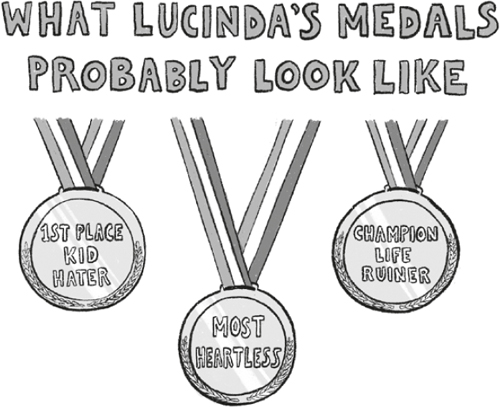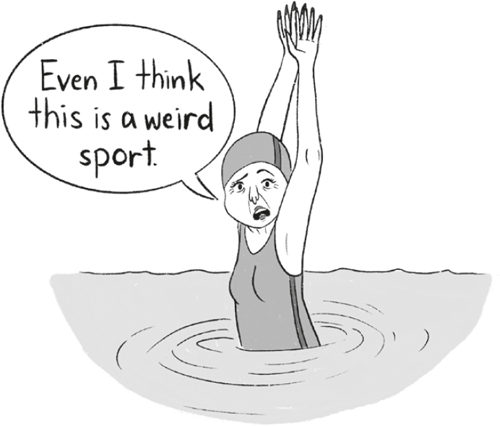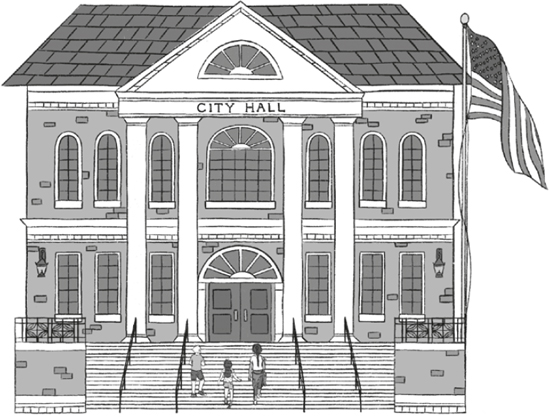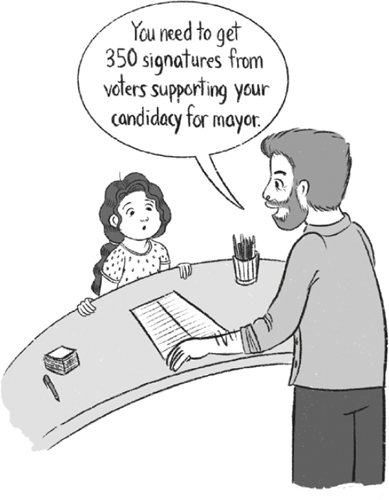CHAPTER 7
“Do you want to run for mayor?” I asked Janet.
“Sure.”
“I’m not joking,” I told her.
“I know you’re not.”
It was the next day, and Janet was fixing an after-school snack for me and My Friend Daniel. I’d been thinking all day about how I could ask her to run against Lucinda, and I’d come up with all sorts of arguments and counterarguments. It never occurred to me that she’d just say yes.
“Because you need a job,” I explained, even though it sounded like Janet didn’t need much convincing. “And being mayor is a job. And you’re registered to vote here, and you’re over eighteen, so you meet all the requirements.”
“I’d be happy to run for mayor,” Janet said, setting a plate of apple slices and peanut butter down on the table. “It’s not like I’m doing anything else with my life. But you know I won’t win, right?”
“Why not?” I asked.
“Because I have absolutely zero experience in politics. I have no work experience at all, really, unless you count taking care of you, volunteering, and moderating the Weather or Not Weather News Board—which is, by the way, a huge job. But yeah. Nobody in Lawrenceville knows who I am.”
“Some people know who you are,” I pointed out. “We do.”
“Lucinda has been on the city council for years,” Janet said. “Everybody in town recognizes her name, and they trust her. She can point to her record of accomplishments, while I can point to, like . . . getting a sociology degree and living in my parents’ house.”
I knew that everything Janet was saying was true. But I also knew she would be a better mayor than Lucinda.
“Plus, Lucinda is an Olympian,” My Friend Daniel piped up, spreading peanut butter evenly over an apple slice, carefully making sure that no part of the apple was left bare.
“What does that have to do with anything?” I asked.
“Nothing. It’s just cool, that’s all. I wonder if we could see her medals.”

“Lucinda doesn’t have any medals,” Janet said. She took a bite of apple. “I looked it up after she was bragging about it at the town hall. She came in second-to-last place in her event in 1988. Second-to-last at the Olympics is still better than not going to the Olympics at all, but . . .”
“What was her event?” My Friend Daniel asked. “Was she a snowboarder?”
“She did something called solo synchronized swimming,” Janet replied grimly.
“I thought synchronized swimming meant that you had to swim in sync with somebody else,” I said.
“It does,” Janet confirmed.
“So what is solo synchronized swimming?”
“Does that just mean you have to swim in sync with, like, yourself?” Daniel asked.
“Apparently, yes.”

“That doesn’t make any sense,” said Daniel, looking deeply disappointed that the first Olympian he’d ever met had turned out to be such a dud.
“It was only an Olympic sport for a few years before they noticed that it didn’t make sense and got rid of it,” said Janet. “According to the internet.”
“You see?” I exclaimed. “Janet, you would definitely make a better mayor than a solo synchronized swimmer, which is not a thing!”
“I agree,” said Daniel. “I’d really wanted Lucinda to be a snowboarder.”
I leaned over Janet’s shoulder as she pulled out her phone and typed in “how to run for mayor of Lawrenceville.” The board of elections website came up, and it had a bunch of information and deadlines.
“We have to go to City Hall,” Janet read, “and fill out a form to declare my candidacy.”
“Can we go now?” I asked.
Janet checked the time. “It says they’re open until five, and it’s only four now. So we can go today if we hurry. Why not?”
See, this is what I like about Janet. My parents never do anything “now.” My mom would be like, “Sounds like a great idea—let me put it on my calendar for next month.” And then she’d wind up cancelling anyway.

We got to City Hall and went inside. There was a chandelier overhead in the rotunda and a few stained glass windows. We approached the security desk, and I asked the guy there, “Where do you register to run for political office?”
I thought he might laugh at me or say, “Why do you need to know how to run for political office?” But he just smiled pleasantly and said, “City clerk’s office—just down that hallway, five doors down on the left.”

When we got to the city clerk’s office, we were greeted by a man around my dad’s age seated at a computer at the reception desk. Behind him I could see a few other people working away at their computers, a couple of people on the phone, one making photocopies, and another sifting through a box of Dunkin’ Donuts munchkins that had been left on a table.
“How can I help you?” the reception guy asked.
“We want to sign up to run for mayor,” Daniel announced.
“Not all of us,” I clarified. “Just her.” I pointed at Janet.
“Hi,” said Janet.
“Now?” the guy asked. He sounded surprised.
“Yes,” I said.
“Unless you think there’s some reason why we should wait . . .?” Janet said, looking surprised by his surprise.
“No, no,” he said. “The opposite of that, actually. It’s just—you know that the window to file petitions to run for mayor has been open for six weeks, right? It closes on Monday.”
“Well, then it’s a good thing we didn’t wait until Monday!” Daniel said.
“That’s true,” the receptionist acknowledged, “but it only gives you three days to gather your signatures.”
“Signatures?”

“Why?” Daniel asked.
“Because it shows that you’re capable of running a real campaign,” the receptionist said. “If all you had to do was write down your name, hundreds or thousands of people might ‘run’ for mayor, and most of them wouldn’t actually do any work. You have to clear this bar—and it’s a pretty low bar—to show that you’re taking it seriously.”
“It’s not that low of a bar,” Daniel said. “Where are we supposed to find three hundred and fifty people?”
“There are way more than that many kids at school,” I pointed out.
“All of them have to be registered voters in Lawrenceville, though,” the man reminded us. “That means eighteen or over.”
That was so unfair!
“And it has to be their in-person signatures?” Janet asked. “I can’t just ask everyone I went to high school with to email me?”
“In-person,” he confirmed. “This is why we give candidates six weeks to collect their signatures.” He pointed at the calendar and shrugged, like there was nothing to be done about it.
Janet and I looked at each other in dismay.
“Can it be done in three days?” Janet asked the man.
“I have no idea,” he said, handing the forms to her. “But you can certainly try.”